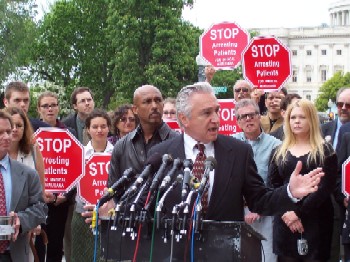The House Appropriations Committee Tuesday approved language seeking clarification of the Obama administration's stance on medical marijuana in states where it is legal. Attorney General Eric Holder has made several statements suggesting the administration would not seek prosecutions of people acting in line with state laws, but some DEA raids have occurred in California, medical marijuana providers continue to be sentenced to federal prison, and federal medical marijuana prosecutions remain in the pipeline, all leading to confusion about where the administration actually stands.

Hinchey, along with Rep. Dana Rohrabacher (R-CA), has in past years sponsored the Hinchey-Rohrabacher amendment, which would have barred the DEA from using federal funds to raid medical marijuana providers in states where it is legal. Now, despite Holder's remarks, Hinchey and the committee are seeking to remove any ambiguity in the administration's position.
The language is part of the Commerce, Justice, Science and Related appropriation bill for fiscal year 2010. The full House will consider the measure sometime in the next few weeks.
"I'm very pleased that the House Appropriations Committee today approved a simple, straightforward provision that will provide clarity as to what the Obama administration's precise policy is on medical marijuana," Hinchey said. "I've been greatly encouraged by what President Obama and Attorney General Holder's public statements in support of states determining their own medical marijuana, but remain concerned about the matter since the federal government has still continued raids in states that permit the use of marijuana for medicinal purposes. This provision will provide Congress with the transparency we need to determine whether any further legislative action is needed. It's imperative that the federal government respect states' rights and stay out of the way of patients with debilitating diseases such as cancer who are using medical marijuana in accordance with state law to alleviate their pain."
The move was good news for medical marijuana advocates. "We are glad to see the federal government finally moving toward sanity on medical marijuana," said Marijuana Policy Project director of government relations Aaron Houston. "No one battling serious illness and following their state's laws should live in fear of our federal government, and we look forward to clear assurances that suffering patients will be left alone."
Americans for Safe Access (ASA) also praised Hinchey and the committee. "ASA applauds Congressman Hinchey's continued leadership on this matter and welcomes the support for this provision by the House Appropriations Committee," wrote Caren Woodson, ASA director of government affairs. "I hope that this provision helps to clarify who, under the new policy, will arbitrate whether there has been any violation of state law. This is especially important for medical marijuana advocates to the extent that federal defendants are still prohibited from providing any evidence during federal trial that the activities for which they stand accused were done in accordance with state law. As such, ASA believes it is absolutely imperative that any alleged violation of state law be handled strictly within the state."
This work by StoptheDrugWar.org is licensed under Creative Commons Attribution-ShareAlike 4.0 International
Add new comment